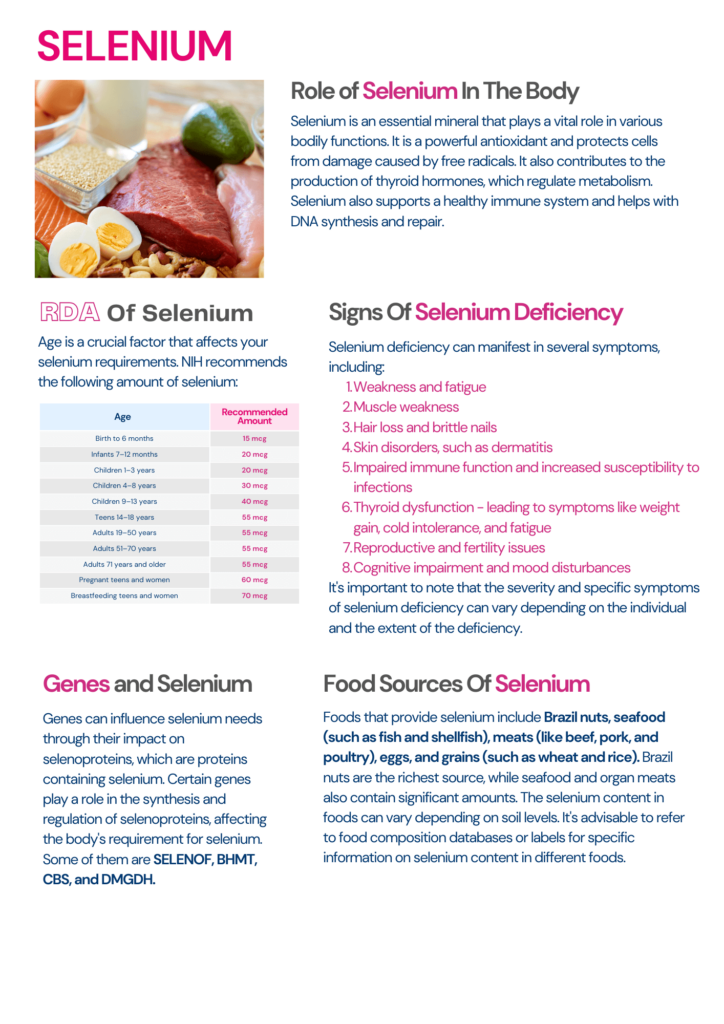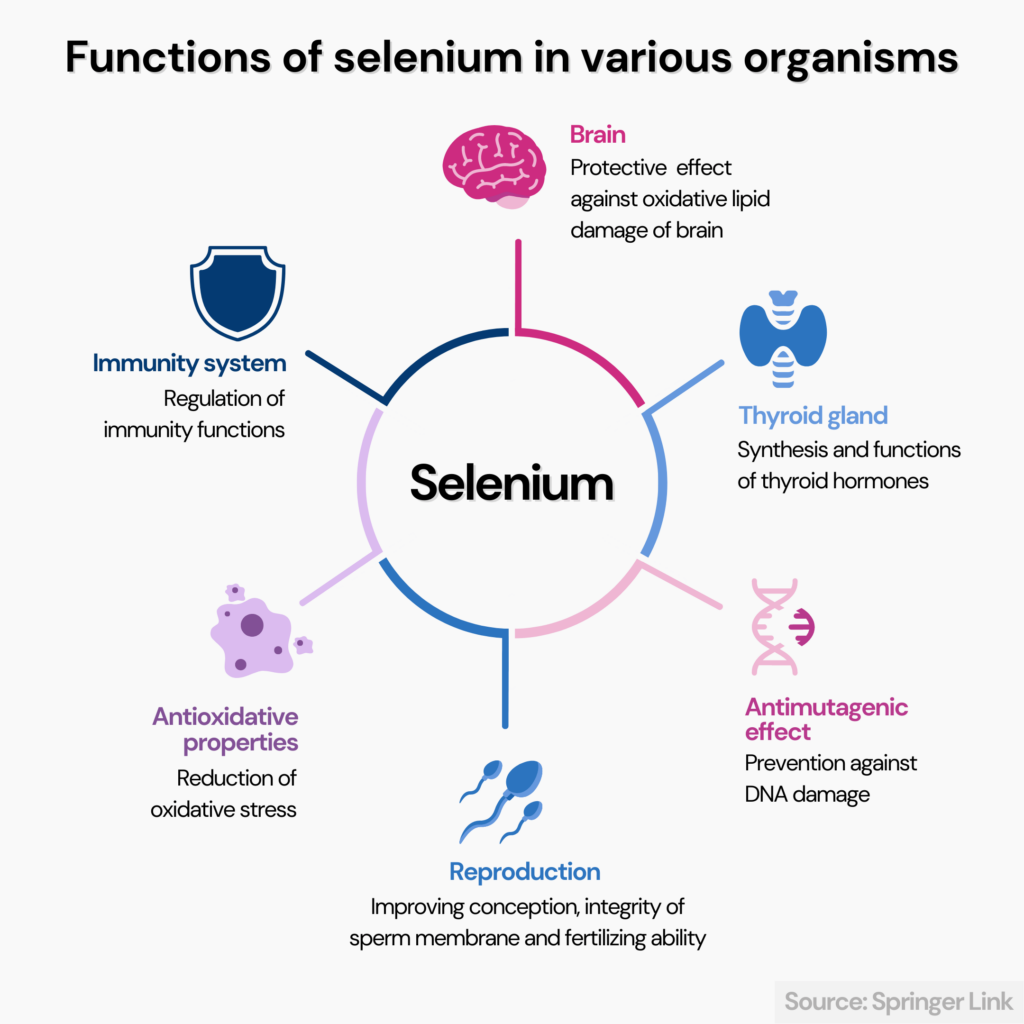When it comes to a balanced diet, most people only focus on the macronutrients and dismiss the equally important trace minerals. One such micronutrient is selenium. This trace mineral plays a role in various functions of the body and is especially important for women. From aiding in increasing estrogen levels to improving fertility and preventing pregnancy-related complications, maintaining adequate levels of selenium will help women stay healthier physically and mentally. This article will take you through seven science-backed selenium benefits for women and also go on to suggest the best food sources to consume recommended levels of the mineral.
Did You Know? Your genes influence how much your body absorbs and utilizes selenium from food. Certain gene changes can increase your risk for selenium deficiency. Learn more.
What Is Selenium?
Selenium is a rare mineral found in the earth’s crust.
Plant sources that grow in regions where the soil is rich in selenium absorb this mineral.
Animals that graze on these plants end up ingesting selenium.
As a result, many plant and animal-based foods that humans consume have traces of selenium.
What Role Does It Play In The Body?
Selenium plays a role in many everyday functioning of the body, including the following.
- Thyroid gland functioning
- Reproduction
- Protection from free radical damage
- DNA production
- Protection from infections
How Much Selenium Does A Woman Need?
According to the National Institute of Health, the following are the recommended dietary allowance of selenium for women.
| Age | Recommended amount of selenium (mcg) |
| 0-6 months | 15 |
| 7-12 months | 20 |
| 1-3 years | 20 |
| 4-8 years | 30 |
| 9-13 years | 40 |
| 14+ years | 55 |
| Pregnant women | 60 |
| Lactating women | 70 |
What Does Selenium Do To A Woman's Body?
While the right amounts of selenium benefit both men and women, this trace mineral may be especially favorable for women because of its ability to boost estrogen.
Does Selenium Boost Estrogen?
Estrogen is the primary female hormone responsible for developing female sexual characteristics in women.
Low estrogen levels may increase the risk of certain cancers, heart diseases, osteoporosis, and insomnia.
Low estrogen levels may also cause vaginal dryness, mood swings, hot flashes, and night sweats.
For estrogen to be helpful to the body, it needs to be broken down into various other compounds that the body uses.
Selenium helps the liver break down estrogen into usable forms.

7 Selenium Benefits For Women
May Lower Heart Disease Risk
Adequate selenium intake may reduce the risk of heart disease.
A 2006 meta-analysis analyzed the effects of selenium on coronary health in 25 observational and six randomized trials.
The study reported that selenium concentrations were inversely proportional to heart disease risks.
A 2016 meta-analysis of 16 observational and 16 randomized control trials also reported similar results.
May Improve Breast Cancer Survival Rates
Lower selenium levels are associated with decreased survival rates after a breast cancer diagnosis.
A 2021 study analyzed the relationship between selenium levels and ten-year survival rates in women diagnosed with breast cancer.
This study reported that the cumulative 10-year survival rate for women with lower serum selenium levels was 65.1%.
In comparison, the 10-year cumulative survival rate of women with higher serum selenium levels was 86.7%.
May Reduce Oxidative Damage
Free radicals are found in the atmosphere and are also byproducts of metabolic processes.
Excess free radicals cause oxidative stress and damage the body's cells.
Cell-level oxidative damage causes various diseases, including inflammation, premature aging, Alzheimer’s, heart conditions, and cancers.
Selenium has antioxidant properties and helps protect against oxidative damage.
May Improve Thyroid Health
Selenium is essential for thyroid health.
This trace mineral plays a role in the production of thyroid hormones.
A 2015 cross-sectional observational study analyzed the effects of selenium levels on thyroid function in 6,152 participants in China.
According to the study, low serum selenium levels increased the risk of thyroid diseases.
May Improve Mental Health
According to the U.S. Department of Health and Human Services, one in five women experience a mental health condition such as depression, anxiety, or bipolar disorder.
A 2022 article on selenium and mental health states that the anti-inflammatory properties of selenium may help handle signs of depression.
Selenium may help manage various mental health conditions by regulating the thyroid hormones.
Brain-Derived Neurotrophic Factor (BDNF) is a protein that plays a role in brain neuron growth, maintenance, and development.
Low BDNF level is associated with various mental and neurological issues, including cognitive dysfunction, depressive disorders, Alzheimer’s disease, and Parkinson’s disease.
An older study on rodents reports that low selenium levels may lead to low BDNF levels in the brain and affect mental health.
May Boost Immunity
Studies report that selenium plays a role in bringing down inflammatory responses in the body and improving adaptive immune responses.
Selenium deficiency may lead to slower immune response and abnormal immune cell functions.
May Improve Female Fertility
While many studies relate adequate selenium levels to improved male fertility, this trace mineral also seems to have similar effects in women.
A 2022 systematic review reports that selenium supplementation may improve reproductive efficiency in women undergoing in-vitro fertilization treatments.
The same report also adds that maintaining the right selenium levels may prevent problems like preeclampsia and preterm birth in pregnant women.

Does Selenium Pose Any Health Risk?
According to the U.S. Department of Health, the tolerable upper intake limit of selenium for adults over 14 is 400 μg/day.
This is the maximum dose people can consume without dangerous side effects.
Consuming extremely high doses of selenium may lead to toxic effects.
Selenium Toxicity
According to experts, both acute and chronic ingestion of high quantities of selenium can cause toxicity.
A 2008 PMC article discusses the potential outbreak of selenium toxicity by a manufacturing company in 2008.
The affected people consumed a dietary supplement that contained 200 times more selenium than what was mentioned on the label.
The following were the symptoms recorded in the 201 identified cases of selenium toxicity.
| Symptoms | Percentage of people with selenium toxicity |
| Diarrhea | 78% |
| Fatigue | 75% |
| Hair loss | 72% |
| Joint pain | 70% |
| Brittle nails and nail discoloration | 61% |
| Nausea | 58% |
Food Sources Of Selenium
Seafood and organ meat are some of the richest sources of selenium.
Some grains and other plant-based food also contain adequate amounts of minerals.
| Sources of selenium | Micrograms/serving |
| Brazil nuts | 544 |
| Tuna | 92 |
| Sardines | 45 |
| Ham | 42 |
| Shrimp | 40 |
| Beef | 33 |
| Chicken | 22 |
| Brown rice | 19 |
| Egg | 15 |
| Milk | 8 |
| Spinach | 5 |
| Cashew nuts | 3 |
Table source: https://ods.od.nih.gov/factsheets/Selenium-HealthProfessional/
Supplements For Selenium Benefits For Women: An Overview
Selenium offers various benefits to women of all ages.
Selenium-deficient women should talk to their doctor and consider supplementing the mineral orally.
The following categories of women are at a higher risk of selenium inadequacy.
They may also benefit from oral selenium supplements.
- Women living in selenium-deficient regions like parts of China and Europe
- Women with HIV infection
- Women undergoing kidney dialysis
- Women with asthma or thyroid disorders
- Women recovering from certain types of cancers
Those with adequate levels of serum selenium can maintain or improve the numbers by carefully choosing a diet rich in selenium.
Including seafood, organ meat, and Brazil nuts regularly will help improve serum selenium levels.
Here's An Interesting Read For You:
How Genes Influence Selenium Requirements
Selenium Genetic Test
The Gene Nutrition panel of Xcode Life includes 47 important nutritional aspects. 13 significant markers are analyzed for selenium needs.
If you have done an ancestry genetic test with companies like 23andMe, AncestryDNA, MyHeritage, etc., you can learn your selenium deficiency risk gene status in just 3 steps.
- Download your DNA raw data from your service provider
- Add the “Gene Nutrition” report to your cart (or the Xcode Life Genome Pack for a 48% discount)
- Upload your raw data and receive your results within 24 hours.
No DNA Test? No Problem
Not yet tested?
If you're new to the world of genetic testing, we've got you covered!
You can now get your ancestry DNA kits at an additional discount!
By following the link provided in this article, you can purchase a DNA kit at 10% OFF (the discount will be reflected when you add the product).
This will ensure that you have everything you need to embark on your genetic journey.
- 23andMe Ancestry Kit
- 23andMe Health + Ancestry Kit
- AncestryDNA Kit (currently no additional discount available)
Once you receive your kits, you can follow the instructions given by the respective service providers to collect your sample and ship it.
After you receive your DNA test results from the kit, you can upload your DNA data to our secure platform.
Summary: Selenium Benefits For Women
- Selenium is a trace mineral that the body needs to perform various functions. Selenium is essential for women to protect their physical and mental health.
- Adult women need about 55 micrograms of selenium daily to maintain adequate mineral levels.
- Selenium helps break down estrogen in the body into usable forms. Low selenium levels may lead to low estrogen levels in women.
- Selenium helps reduce the risks of heart disease and cancer. It also improves thyroid health and mental health.
- Selenium is also proven to improve female fertility, reduce asthma severity, and improve immunity.
- Extremely high doses of selenium can be toxic and cause nausea, vomiting, diarrhea, nail discoloration, and hair loss.
- The top sources of foods high in selenium are Brazil nuts, sardines, ham, tuna, shrimp, beef, and chicken.
- Women who are selenium deficient or inadequate may benefit from consuming oral supplements of the mineral after discussing it with their doctors.
References
https://academic.oup.com/jcem/article/100/11/4037/2836081
https://pubmed.ncbi.nlm.nih.gov/19033020/
https://pubmed.ncbi.nlm.nih.gov/25990689/
https://pubmed.ncbi.nlm.nih.gov/16093440/
https://www.ncbi.nlm.nih.gov/pmc/articles/PMC7998294/
https://www.ncbi.nlm.nih.gov/pmc/articles/PMC2698273/
https://www.ncbi.nlm.nih.gov/pmc/articles/PMC5986464/
https://pubmed.ncbi.nlm.nih.gov/9584835/
https://www.nature.com/articles/s41598-022-05078-1
https://academic.oup.com/jcem/article/100/11/4037/2836081
https://www.ncbi.nlm.nih.gov/pmc/articles/PMC6321086/
https://www.ncbi.nlm.nih.gov/pmc/articles/PMC6321086/
https://ods.od.nih.gov/factsheets/Selenium-HealthProfessional/
https://www.healthline.com/nutrition/selenium-benefits
https://www.webmd.com/a-to-z-guides/supplement-guide-selenium
https://www.medicalnewstoday.com/articles/287842#recommended-intake




